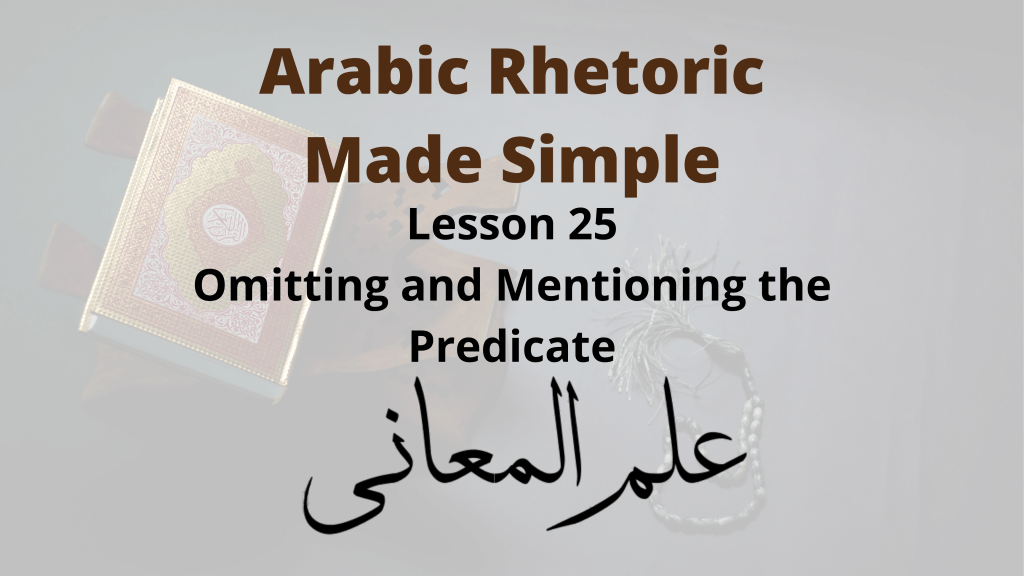In this lesson on Balagha, we are going to begin chapter 3 of this science which discusses the predicate of a sentence. We are going to learn why you would omit or mention the predicate.

The reasons for omitting the predicate are actually the same as the reasons for omitting the subject, which we learned at the beginning of the previous chapter.
Examples of Omission
Let’s go through some examples to refresh our memory.
Our first example is by a poet, Daabi’ ibn al-Harith who said:

The poet is expressing sorrow over being a stranger in the city where everyone seems to be at home.
Notice the grammatical structure in the second couplet.
We have إِنّ, the ism of إِنّ (the ي), and the khabar of إِنّ which is بها لغريب.
Here we have a full sentence with a mentioned subject and a mentioned predicate. Then what happens to the word قيّار? The astute among you will notice that because of some grammatical technicalities we cannot exactly incorporate قيّار into the ism of إِنّ. We cannot say ي with قيّار becomes the ism of إِنّ and بها لغريب becomes the khabar of إِنّ. It has to be made a separate sentence on its own.
Basically we have two sentences:
- I am a stranger in it (the city)
- Qayyar is a stranger in the city
But in the second sentence, all that has been mentioned in the text of the poem is قيّار. The predicate has been omitted.
Why? Why did the poet not just say “I am a stranger to it, and Qayyar is a stranger to it”? With both sentences fully mentioned.
There are many reasons:
- The meaning is understood based on what has been mentioned. So, repetition of the predicate would be superfluous.
- The poet doesn’t have much room in a single couplet to mention every little word.
- Even if the poet did have room, he needs to preserve the meter and the rhythm.
- Poetry is obviously often concise and words are expansive in meaning. This is just yet another example of that.
In this one example we have seen four of the reasons for omitting the predicate of a sentence. If you refer to the lesson on omitting the subject of a sentence from the previous chapter, you will notice the same reasons appearing there as well.
One thing to always remember though, as we learned in the previous chapter is that you can only omit the subject or predicate if you leave a clue that something has been omitted. Obviously, you cannot just omit something and have the meaning change, or leave the reader confused. That goes without saying.
Another example of omitting the predicate comes in the form of فاء فجائيّة /faa fujaaiyya/ which holds the meaning of “suddenly”. For instance:

Notice that only the subject زيد has been mentioned. The predicate (something like موجود) has been omitted. The reason for this is idiomatic usage.
Typically with فاء فجائيّة /faa fujaa’iyyah/, the sentence that it enters upon will have its predicate omitted because it is understood that it is going to be something like “suddenly he was there”, or “suddenly there he stood”, or something along those lines.
There is no need to mention it in this type of structure.
Our next example comes from a poet who says:

The poet is basically saying that in this world we have a short stop and towards the next world we have our journey, one that many before us have embarked upon and of course there is no returning back for them. We are soon to follow in their footsteps. That is the gist of the poem.
Notice the sentence in إنّ محلّا, and you will notice the same thing in إنّ مرتحلا. Here the predicate has been omitted.
The full sentence would have been إنّ لنا في الدنيا محلّا.
Many of the reasons for omitting the predicate here are the same as we have already seen. The poet has to mind the available space, he has to preserve the meter and so on.
But there is an additional reason in this couplet. The poet is trying to leave it up to the reader to figure out exactly what he is saying, instead of just spelling it out. By saying something like “Verily a journey”, I am just leaving it at that. This really pushes the reader to think about what is being communicated. It grabs the reader’s attention. It forces the thought process. It gives the reader greater joy when he figures something out. It respects the reader that he is capable of figuring things out.
Omitting the subject or predicate of a sentence to achieve this is called العدول إلي أقوى الدليلين.
Let’s do another example.
Allah says in Surah Yusuf, quoting Yaqoob (peace be upon him):

Notice that this is not a full sentence, but the interesting thing here is that we can either assume that this is the subject and the predicate has been omitted, or this is the predicate and the subject has been omitted.
- فصبر جميل أجمل (A great patience is better)
- فأمري صبر جميل (My course of action will be a great patience)
Part of the purpose of omission here is to allow for both interpretations. If there was no omission one of these interpretations would have to be determined/ fixed. The verse would lose flexibility in that case. It’s pretty neat.
Mentioning the Predicate
As for mentioning the predicate of a sentence, the primary reason is that mentioning is default, and as long as there is nothing causing us to opt away from the default, we will mention the predicate.
But there are some reasons beyond this that particularly encourage us to mention the predicate. It may be default to mention it but there is some particular reason that we are especially going to mention it. We have seen a lot of those from the previous chapter on mentioning the subject. One of those reasons is to avoid confusing or messing up the meaning of the sentence. Another reason is to be condescending to the listener and to spell everything out for him.
- Proceed to next lesson: Types of Predicate in Arabic
- Return to index page: Intro to Ilm Ul-Ma’ani
- Start free lessons: Sign Up for Free Mini-class